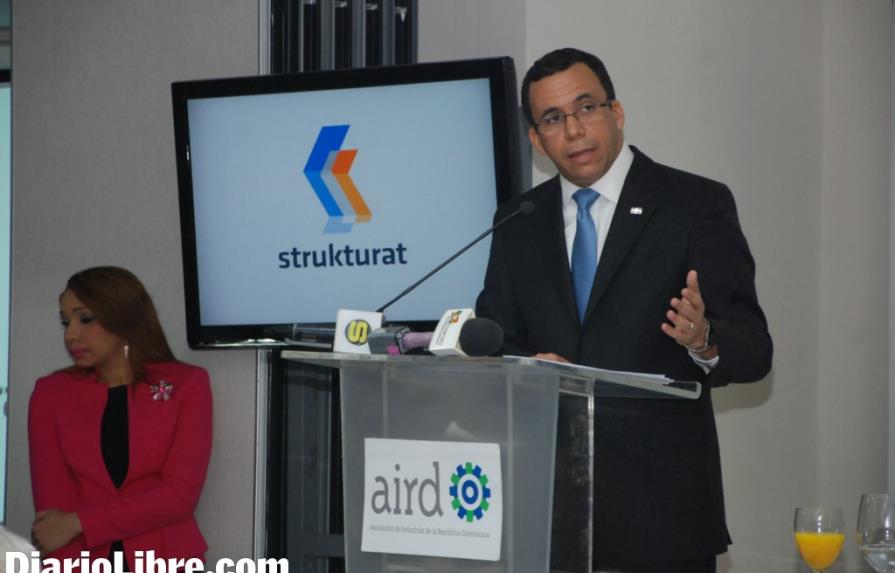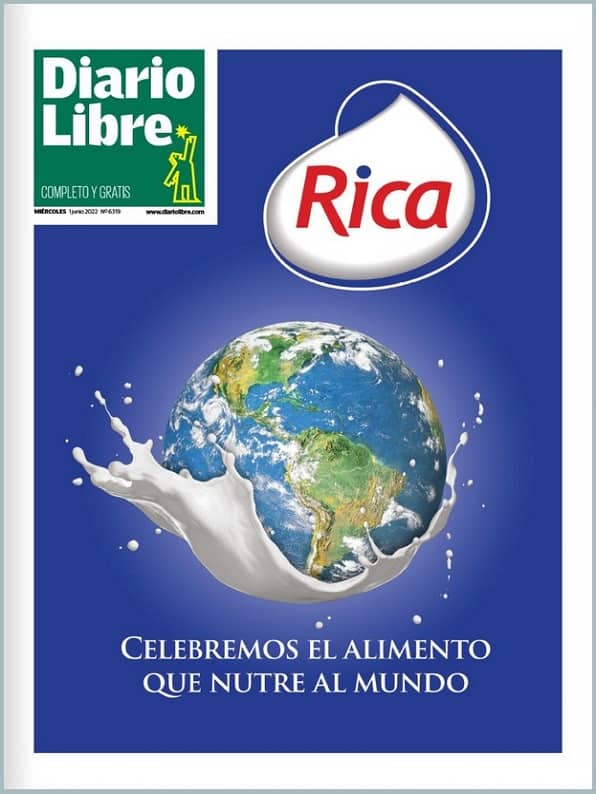Chancellor to industrialists: You don't have to fear mass deportations
He says they will coordinate the repatriation of their nationals with Haiti

SD. Chancellor Andres Navarro said yesterday before the industrial sector of the country that there is no need to fear mass deportations of Haitian immigrants, once the National Plan of Normalization comes to an end, next 17 June.
"You don't have to fear, as some sectors fear, that mass deportations are on the horizon. How can anybody think that this could happen? Plain and simple: Whoever is promoting this sort of idea, what they want to do is cause damage to the country. This has never been done here," he underlined as he took part in the breakfast on the theme of "The Foreign Policy of the Dominican Republic," sponsored by the Industrial Association of the Dominican Republic (AIRD) at the Torre Empresarial.
In 2014 Haitian labor made up 3.4% of the Economically Active Population in the country, according to information from the Ministry of Labor, and is vital in productive sectors such as farming and construction.
Nonetheless, the Chancellor guaranteed that whoever has to be deported will be repatriated, "because we have to control our territory," but he reiterated that this will be done respecting people's rights.
He stated that these terms "have been made clear to the Haitian government," which has asked that the deportation process be done in a coordinated manner between the two countries, a deference that the Dominican Republic is willing to make.
"This is because in order for repatriation to be carried out under the protocols which guarantee the human rights of the persons, it is necessary to coordinate with the country of origin," he explained.
Likewise, he revealed that the issue of repatriations was included in the bilateral agenda which is being discussed in the Mixed Commission, in order for the Haitian government to begin preparations to receive its citizens.
The high ranking official reiterated that the Dominican government has done "everything possible" in order that the Normalization Plan be a success, but it is necessary for the Haitian government to document its citizens in order to register them in the plan.
In this sense, he reported that the Haitian government committed itself to open this month an office in Santiago in order to document its citizens, and later those of Barahona and Higüey. "And I can tell you, we are going to do a good job," he guaranteed.
He explained that at the present juncture they are working on a third axis of the agenda with Haiti, which is social, where they will facilitate talks between civil societies of both countries.
"See us as an ally"
Navarro also called upon the business community to see the Ministry of Foreign Relations as an ally, and as a support of their relations with the world. He recalled that they are working on the relocation of diplomatic offices overseas, in regard to the interests of the country, in order to increase exports.
The Chancellor received applause from the audience, which also included government officials, legislators and members of the civil society, when he said that the ministry which he leads has saved RD$18 million, just by removing unnecessary personnel, a number which represents US$1 million in the payroll of the Foreign Service.
However, RD$9 million have been used in order to improve the salary of those that do work.
Regarding the reforms of the foreign-policy, he reported that they have reinforced frontier management, and that they are coming to terms with urban diplomacy in order to connect the cities with the world.
The government has no plans for new free trade agreements (TLC)
The government does not have any plans to establish new Free Trade Agreements, either with Haiti or with other countries, since those existent, with the United States and Central America and the Agreement of Economic Association with Europe and the EPA countries have not been used to their full measure by the country. In the case of Haiti, the Chancellor reported that the country has made it clear that they are not interested at this time. On the other hand, he did say that they are working on strengthening the commercial ties with other countries. In the present context, he meant specifically with Chile and Peru, in order to generate new opportunities.
He will deal with the Minustah regarding truckers' safety
Navarro reported that he will soon meet with the chief of the Stabilization Mission of the United Nations in Haiti (Minustah), Sandra Honoré, in order to deal with the strengthening of the security of Dominican truckers who carry merchandise to the neighboring country, after the latest episodes of confrontation with Haitian carriers.
He said that the issue was dealt with in the Bilateral Commission, and they agreed that Haiti would reinforce security on the routes taken by Dominican truckers, especially the route between Dajabon - Juana Mendez - Cape Haitian. However, he recognized that this safety measure is weak.
"For this reason we agreed that we would add the Minustah to this operation, and to that end, within a couple of weeks we will invite Honoré to come to the Chancellery, in order to see how we can provide greater strength to the Haitian police," he explained.
The official explained that conflicts will constantly occur, because they are dealing with interests, and he indicated that in Haiti there are carriers and syndicates similar to the ones here, which want to move the merchandise which comes from the Dominican Republic.
Trust the dialogue
Regarding the conflict, he said that he felt "that there has to be an agreement so that the other side also has participation." He revealed that the Chancellery invited the syndicates from her in order to begin a process of talks and fair dealings.
In relation to the proposal that collection centers be built on the frontier, he said that this is a priority within the proposals discussed in the Mixed Bilateral Commission.
"You don't have to fear, as some sectors fear, that mass deportations are on the horizon. How can anybody think that this could happen? Plain and simple: Whoever is promoting this sort of idea, what they want to do is cause damage to the country. This has never been done here," he underlined as he took part in the breakfast on the theme of "The Foreign Policy of the Dominican Republic," sponsored by the Industrial Association of the Dominican Republic (AIRD) at the Torre Empresarial.
In 2014 Haitian labor made up 3.4% of the Economically Active Population in the country, according to information from the Ministry of Labor, and is vital in productive sectors such as farming and construction.
Nonetheless, the Chancellor guaranteed that whoever has to be deported will be repatriated, "because we have to control our territory," but he reiterated that this will be done respecting people's rights.
He stated that these terms "have been made clear to the Haitian government," which has asked that the deportation process be done in a coordinated manner between the two countries, a deference that the Dominican Republic is willing to make.
"This is because in order for repatriation to be carried out under the protocols which guarantee the human rights of the persons, it is necessary to coordinate with the country of origin," he explained.
Likewise, he revealed that the issue of repatriations was included in the bilateral agenda which is being discussed in the Mixed Commission, in order for the Haitian government to begin preparations to receive its citizens.
The high ranking official reiterated that the Dominican government has done "everything possible" in order that the Normalization Plan be a success, but it is necessary for the Haitian government to document its citizens in order to register them in the plan.
In this sense, he reported that the Haitian government committed itself to open this month an office in Santiago in order to document its citizens, and later those of Barahona and Higüey. "And I can tell you, we are going to do a good job," he guaranteed.
He explained that at the present juncture they are working on a third axis of the agenda with Haiti, which is social, where they will facilitate talks between civil societies of both countries.
"See us as an ally"
Navarro also called upon the business community to see the Ministry of Foreign Relations as an ally, and as a support of their relations with the world. He recalled that they are working on the relocation of diplomatic offices overseas, in regard to the interests of the country, in order to increase exports.
The Chancellor received applause from the audience, which also included government officials, legislators and members of the civil society, when he said that the ministry which he leads has saved RD$18 million, just by removing unnecessary personnel, a number which represents US$1 million in the payroll of the Foreign Service.
However, RD$9 million have been used in order to improve the salary of those that do work.
Regarding the reforms of the foreign-policy, he reported that they have reinforced frontier management, and that they are coming to terms with urban diplomacy in order to connect the cities with the world.
The government has no plans for new free trade agreements (TLC)
The government does not have any plans to establish new Free Trade Agreements, either with Haiti or with other countries, since those existent, with the United States and Central America and the Agreement of Economic Association with Europe and the EPA countries have not been used to their full measure by the country. In the case of Haiti, the Chancellor reported that the country has made it clear that they are not interested at this time. On the other hand, he did say that they are working on strengthening the commercial ties with other countries. In the present context, he meant specifically with Chile and Peru, in order to generate new opportunities.
He will deal with the Minustah regarding truckers' safety
Navarro reported that he will soon meet with the chief of the Stabilization Mission of the United Nations in Haiti (Minustah), Sandra Honoré, in order to deal with the strengthening of the security of Dominican truckers who carry merchandise to the neighboring country, after the latest episodes of confrontation with Haitian carriers.
He said that the issue was dealt with in the Bilateral Commission, and they agreed that Haiti would reinforce security on the routes taken by Dominican truckers, especially the route between Dajabon - Juana Mendez - Cape Haitian. However, he recognized that this safety measure is weak.
"For this reason we agreed that we would add the Minustah to this operation, and to that end, within a couple of weeks we will invite Honoré to come to the Chancellery, in order to see how we can provide greater strength to the Haitian police," he explained.
The official explained that conflicts will constantly occur, because they are dealing with interests, and he indicated that in Haiti there are carriers and syndicates similar to the ones here, which want to move the merchandise which comes from the Dominican Republic.
Trust the dialogue
Regarding the conflict, he said that he felt "that there has to be an agreement so that the other side also has participation." He revealed that the Chancellery invited the syndicates from her in order to begin a process of talks and fair dealings.
In relation to the proposal that collection centers be built on the frontier, he said that this is a priority within the proposals discussed in the Mixed Bilateral Commission.


 Diario Libre
Diario Libre
 Diario Libre
Diario Libre